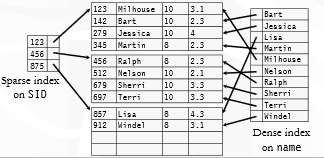Introduction to database management systems
Chapters
Indexing in DBMSes
Indexing is used to optimize certain accesses to data (records) managed in files. For example, author catalog in a library is a type of index. Indexing is defined based on its indexing attributes. Indexing can be of following types:
- Primary Index − Primary index is defined on an ordered data file. The data file is ordered on a key field. The key field is generally primary key of relation.
- Secondary Index − Secondary index may be generated from a field which is a candidate key and has a unique value in every record, or a non-key with duplicate values.
- Clustering Index − Clustering index is defined on an ordered data file. The data file is ordered on a non-key field.
Ordered Indexing is of two types:
- Dense Index : One index entry for each search key value
- Sparse Index : One index entry for each block

Dense versus sparse indexes
- Index size : Sparse index is smaller
- Requirement on records :Records must be clustered for sparse index
- Lookup :Sparse index is smaller and may fit in memory
- Update :Easier for sparse index
Primary and secondary indexes
Primary index
- Created for the primary key of a table
- Records are usually clustered according to the primary key
- Can be sparse
Secondary index
- Usually dense
Description
This free tutorial covers the basics of database management system to help you with your understanding on the topic, Please note that this tutorial assumes that either you are a beginner or just want to brush up your understanding on DBMS
Tutorial covers the topics below
- What is DBMS?
- Architecture
- Data Models
- Data Schemas
- Data Independence
- Entity-Relation Model Basic Concept
- Entity-Relation Diagram Representation
- Generalization, Aggregation
- Codd's 12 Rules
- Relational Data Model
- Relational Algebra
- Structured Query Language
- Normalization
- Database Joins
- Storage System
- Indexing
- Hashing
- Transaction
- Concurrency Control and Deadlock
- Data Backup and Recovery
Audience
Absolute beginners or students who wish to brush up their understanding on DBMSes
Author: Subject Coach
Added on: 16th Sep 2015
You must be logged in as Student to ask a Question.
None just yet!